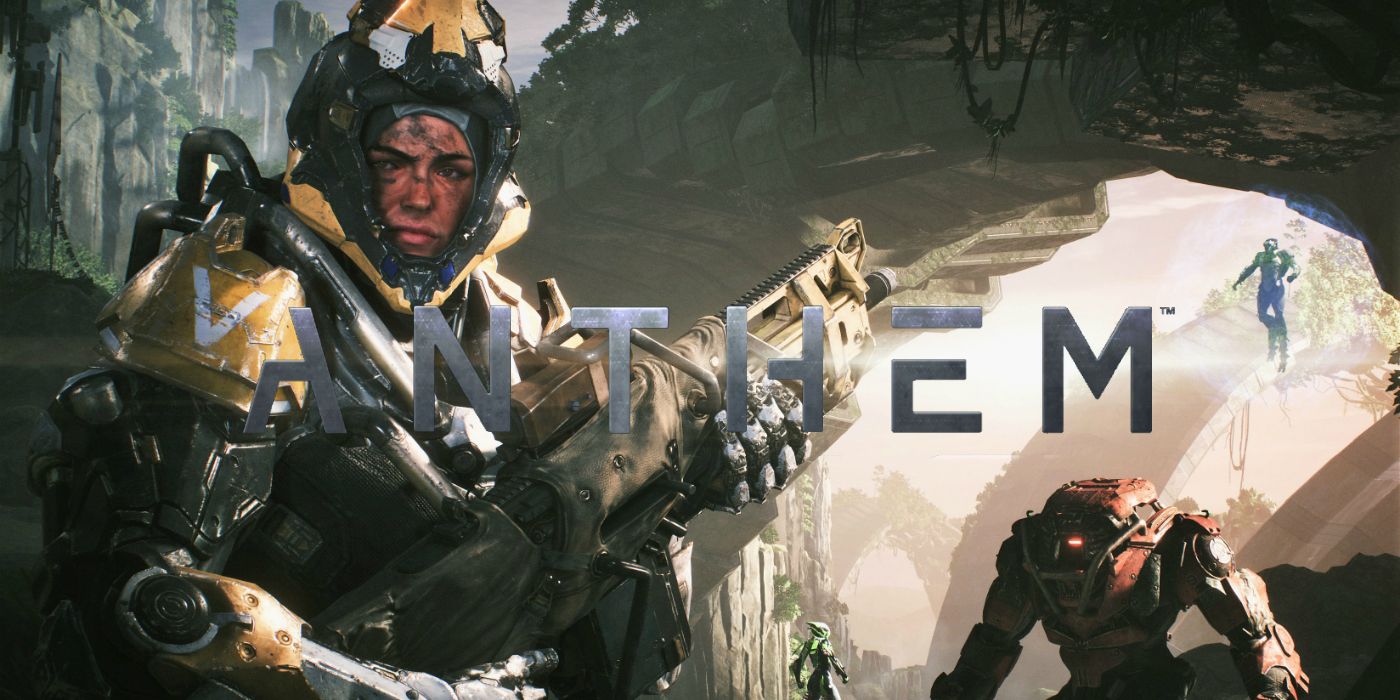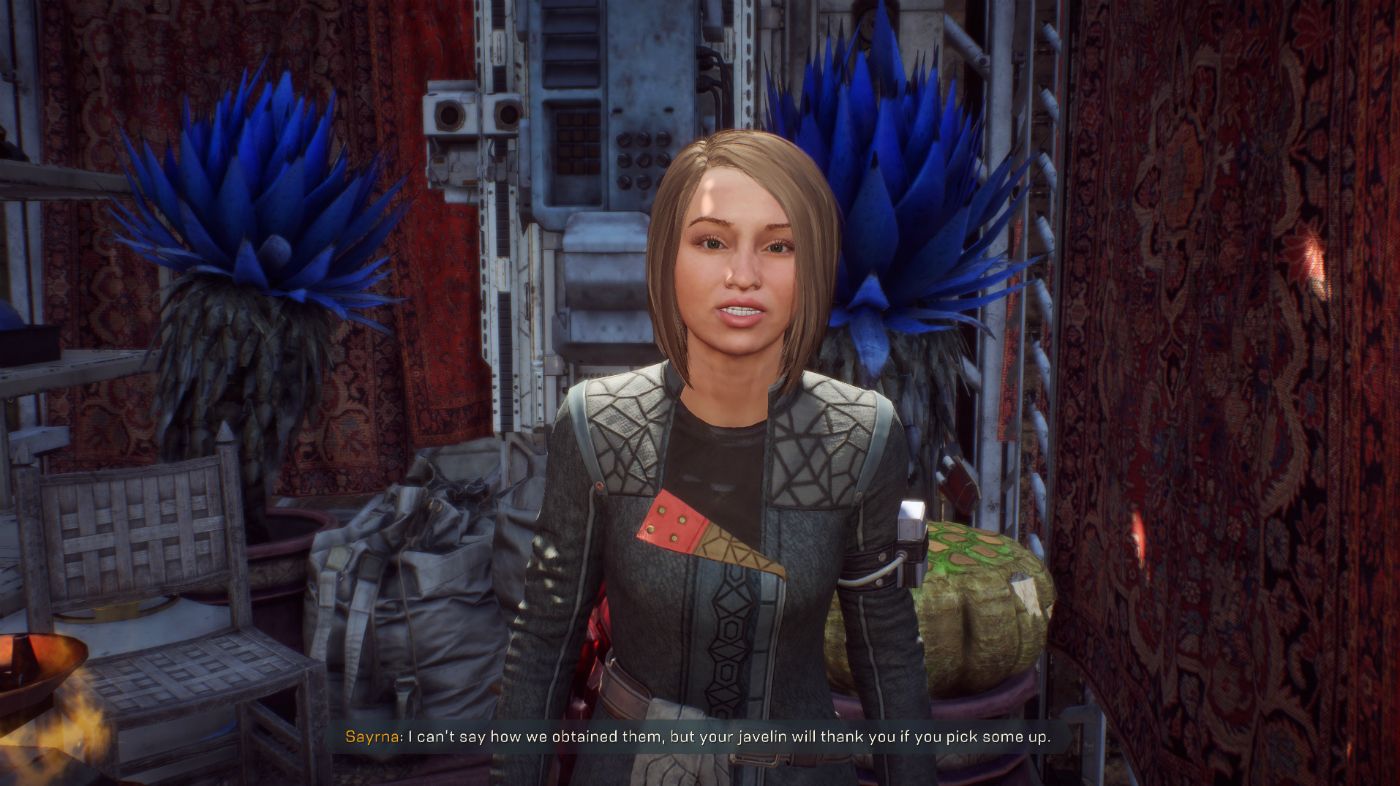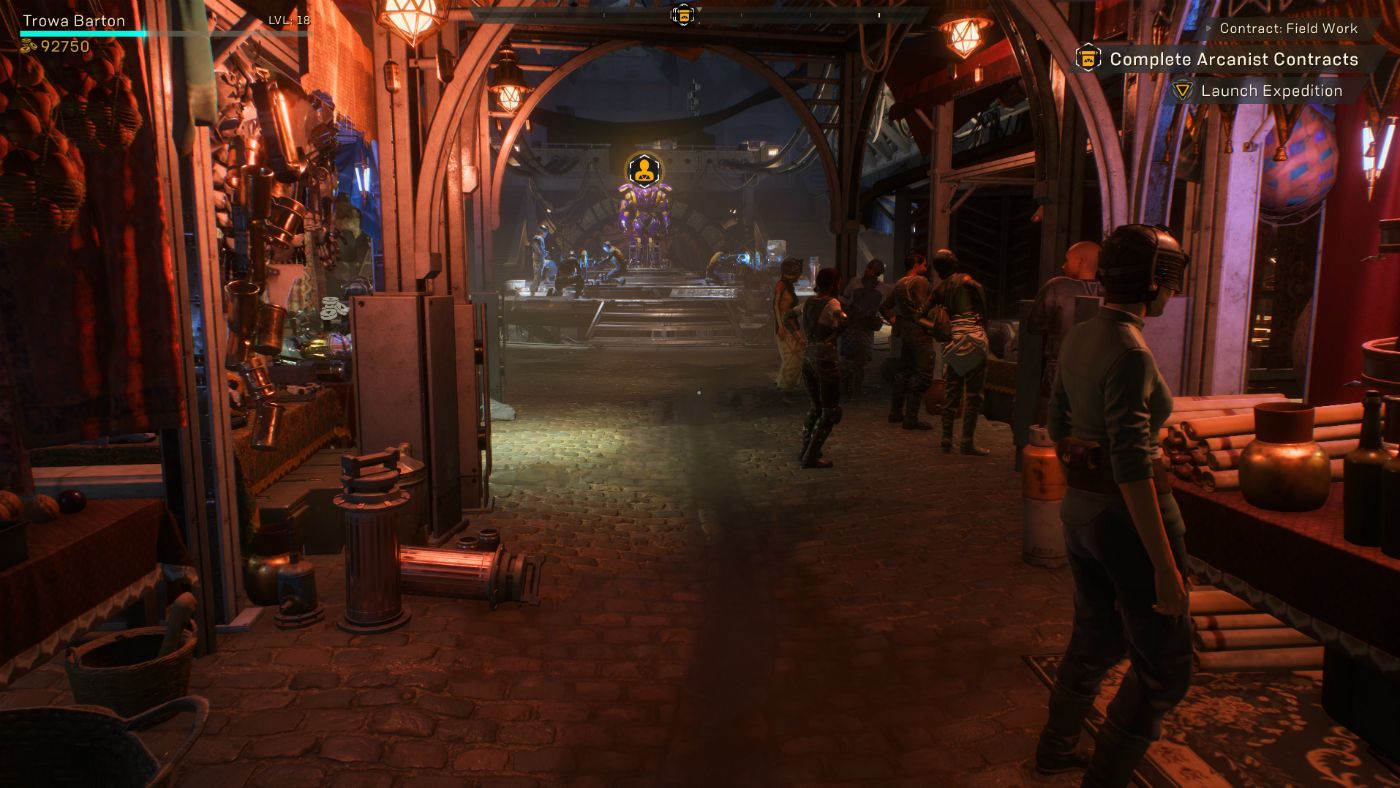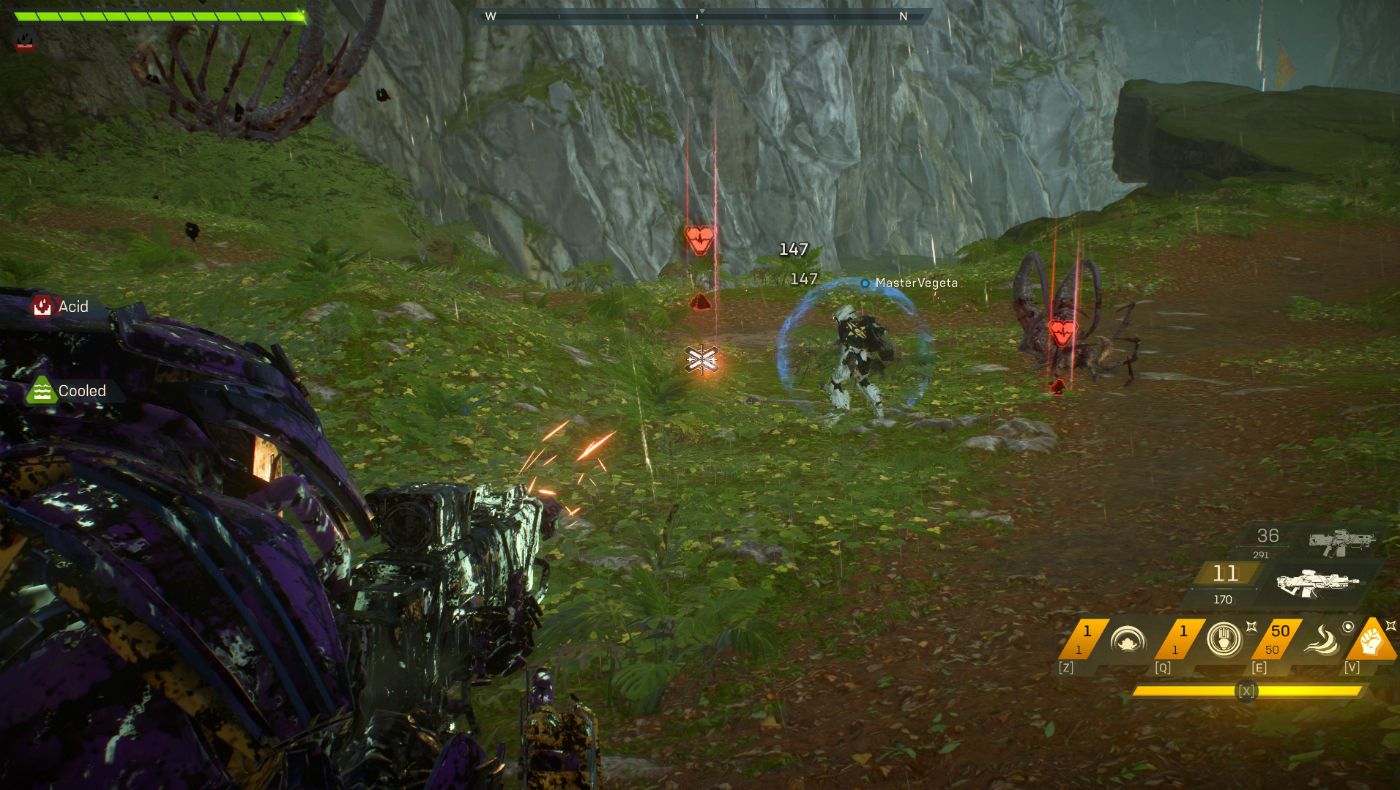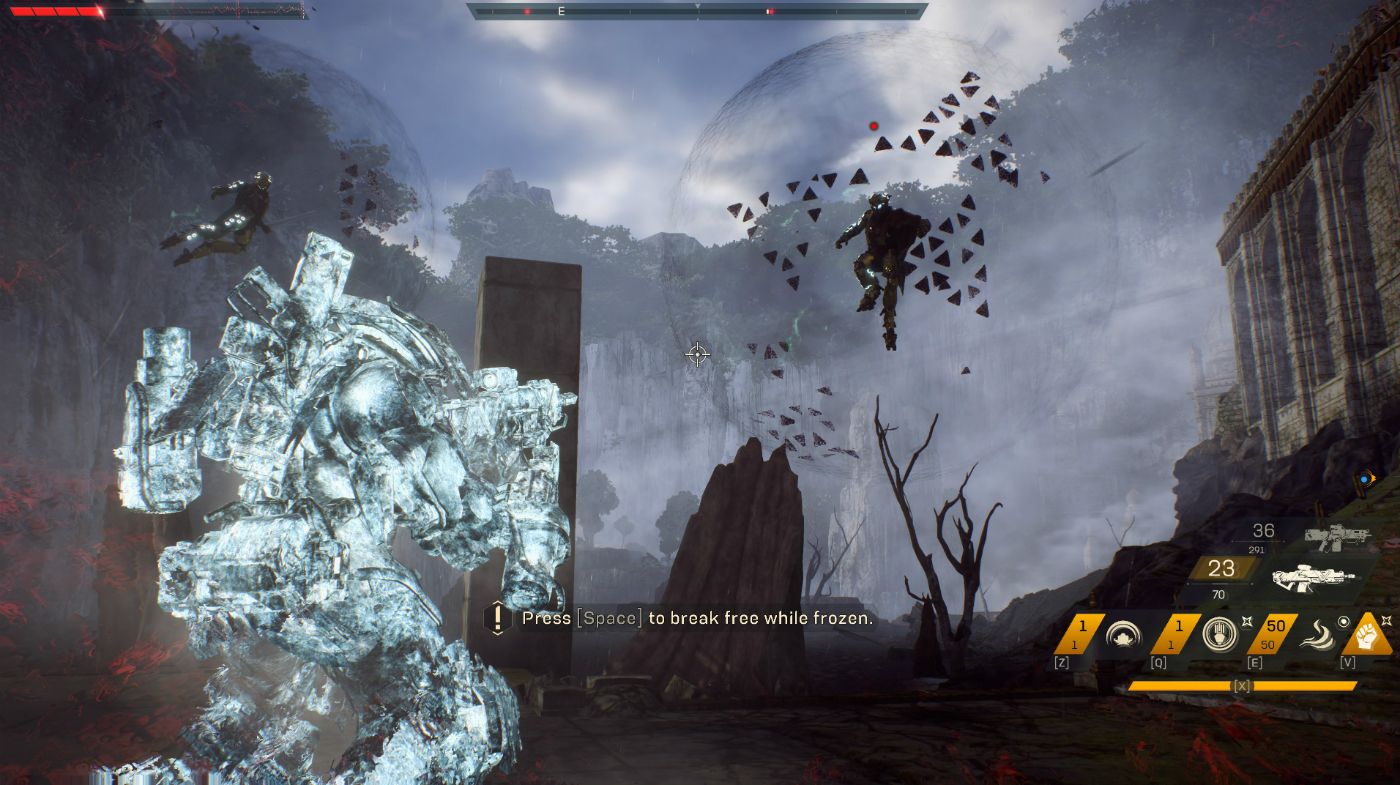Anthem was always going to be divisive. For the devotees of BioWare's back catalogue, the game is an ugly reminder that the studio's parent company, EA, will always loom large over each development decision. What could have been a new Dragon Age or a renewed effort to salvage the disaster that was Mass Effect: Andromeda instead became a game that very clearly wanted to occupy the same space as Bungie's Destiny. For fans of what BioWare has become renowned for over the years, it's a tough, microtransaction and DLC-laden pill to swallow.
Still, if Anthem was good, all would be forgiven. BioWare is more than capable of delivering on Anthem's pitch, which amounts to a sci-fi space shooter with RPG elements and a more involved story than its competitors offer. Playing the game feels a lot like trying to translate the arcane texts that litter the world of Anthem. The process is slow, and painful, but at times there's a glimmer of excitement - a moment where you understand what's at work underneath the game's surface. Those brief flirtations with what could have been, however, are too few. Instead, the most common outcome is just more confusion and a lingering sense of disbelief that this is, somehow, what the long-awaited Anthem ended up becoming.
Related: Anthem: Tombs of the Legionnaires Guide & Walkthrough
How did we get here? That's a question many players will ask themselves after experiencing the full length of Anthem's narrative, which clocks in at about fifteen hours, give or take. It's also worth asking from a development perspective. Regardless of the context of that question, the answer is that there's no singular reason, and the context is muddied. Anthem launches players into its world with very little in the way of explanation, and it attempts to mask that with a tried-and-true tactic of its genre: randomly capitalizing words from a lexicon of science fiction jargon and hoping it sounds important enough to be exciting.
There's the Scar, a population of scavengers, or something. Honestly, it's unclear. They're enemies, and they will occasionally turn up to do Bad Things to people that the player is supposed to care about. Diving into the game's back story via the Journal tab is an option, but why would you? There's no reason to care about the Scar, just like there's no reason to be remotely interested in the Dominion, the Cataclysm, the Cenotaph, or any of the other story conceits that litter Anthem. At the end of the game, there's a reveal that, even if I tried to spoil, would mean nothing to even those who played the game.
That's the problem with Anthem - it's meaningless. Trying to attribute even a semblance of emotion or thought to what's occurring in-game is a recipe for a headache at best and a long night of binge drinking at worst. BioWare is supposed to be good at this. It's the studio's selling point - really good games that set themselves apart with an extra bit of attention paid to character development and environmental design. Somehow, we ended up with a game that traded those qualities for the worst parts of Destiny, an exchange that would make even the seediest information broker feel guilty. People have criticized this genre for being too vague. The response, in Anthem, was to create a villain called The Monitor who has absolutely no character motivation outside of being bureaucratically evil and desiring Generic Power, whatever form that may take.
The reason we got this mess is obvious. Anthem is already trying to set up its free storyDLC expansions. Players learn absolutely nothing about the world or its people that wasn't immediately obvious during the first few hours of gameplay. None of the factions have any depth. If the intent with Anthem isn’t to churn out DLC at a quick clip, then the publisher was instead okay signing off on something that feels like a hastily created collage of all the worst tropes in sci-fi.
Perhaps it was unfair to expect BioWare to be able to pay as close attention to a more malleable world in Anthem than the ones it has traditionally built. That's fine. Anthem's questionable story isn't the worst part of the gameplay experience. Loot is where Anthem starts to unravel. Hooking players with enticing new gear is a way to get them to keep coming back to the game every day. Gearing in Anthem is hollow. Nothing about a player's gear over the entirety of story mode makes it feel cool or unique. In fact, any time the game teases that a player will get something legendary, it also takes it away within an hour at best. The result is a game that expects its players to enjoy swapping one unremarkable gun for another that makes their power rating continue to climb, painfully slowly.
Speaking of ascension, including a vertical axis in Anthem's main third-person gameplay opens up some interesting possibilities. Flight is breathtaking. Exploring the world map while alternating between dizzying dives and desperate climbs just doesn't get old. There's not much to do with that kind of flight beyond exploration and trying to flee a difficult battle, though, so it feels like it's an underutilized element of a game that desperately wants design like this to set itself apart from competitors.
That's the most frustrating part of Anthem: there is genuine joy bubbling underneath the layers of mediocrity. The suits are built to explore Anthem’s visually stunning landscape. The combat itself is a lot of fun. It's a great riff on class-based shooters, and each of the four playable Javelin suits has been balanced, especially after the "day one" patch released before the game's official launch. The difference between using a melee attack as a super fast Interceptor and a hulking Colossus is radically different. The animations are smooth - smacking away an enemy with a shield feels satisfying and looks good. The Storm rains down elemental fury onto a battlefield and it's difficult not to just watch in awe for a few seconds. The Interceptor’s swordplay and the Ranger’s array of tactical gear are likewise well-suited to demolishing the many faceless enemies players will come across during questing.
Enemies don't really offer much variation in terms of tactics or appearance. Some enemies freeze players, which is annoying; other enemies shock them, which is just a different flavor of annoying. There's nothing that feels particularly different about the various status effects, enemy types, or battles.
This malaise is upended when players get the pleasure of fighting a Titan. They're difficult enemies with varied attacks that mimic what a dungeon boss in an MMORPG might feel like. The phases are tighter, but there's a dance to navigating attack and defense. It's worth noting that the flexibility of character roles mid-fight is never more apparent than in the moments party members are taking refuge from the Titan's death lasers. Players can alter their tactics on the fly, and often have to during the chaotic encounters.
Unfortunately, all the compelling combat in the world cannot liberate this game from the trappings of its repetitive nature. The problem comes in the form of an extremely limited number of mission types and world events. The storyline missions just rinse and repeat skirmishes, standing by something until it finishes down-or-uploading, or solving very simple puzzles - the same one, by the way, ad nauseam. Anthem's end-game is no different. It’s slightly more difficult, or the rewards have a better shine to them, but it still feels like work. Even after some quests were fixed, the game continues to buckle under the weight of the many basic elements holding it back.
The sum of all Anthem’s parts is a collection of intricate, enthralling moments lost in a sea of exceedingly average design elements. When Anthem works, it feels like it has all the tools to be something special. When it doesn't, it feels like it's just barely being held together by the barest inklings of a competent shooter. Even beyond the technical problems - the loading screen hangups that haven't been fixed even with the update, the glitches during fights or quests that halt progression, and more - it's fundamentals that sink the game. Loot shouldn't be this dull. Enemies shouldn't be this simple. And for a world as beautiful as Anthem, there should be much more to do than admire it from a distance like it's a biome at a science exhibit somewhere.
A lot of the issues with Anthem are the kind of thing that can easily be patched out or refined, and some of them already are. The problem is getting people to wait for that. Anthem is a soulless experience, possessing very few beats that elicit any kind of joy. It's a sad song, sung by someone who doesn't believe in their own message, and it shows. If Destiny was the hit single, Anthem is the bad cover.
More: BioWare Started Developing Anthem Way Before Destiny Even Came Out
Anthem is available now for PC, PS4, and Xbox One. Screen Rant was provided with a PC code for the purposes of this review.

